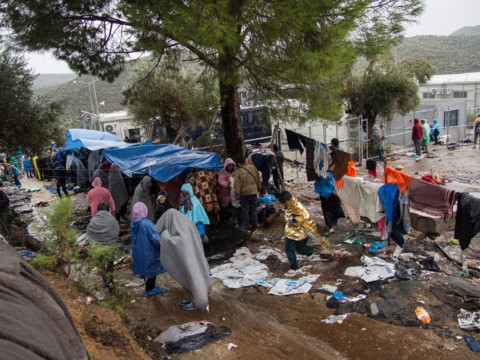Managing migration: a European responsibility
By Dimitris Avramopoulos
Europe continues to face migratory pressures, but the difference between now and just two years ago is like night and day.
The European Commission is not just discovering this issue now.

EU countries are expected to say by September how many refugees they would be willing to resettle over the next year. (Photo: Save the Children)
I was proud to take up the challenge and, since then, we have been working together on a European approach to dealing with migration. We have already made enormous progress - achieving more in the past two years than what was possible in the twenty before it.
From saving lives at sea, to tackling the root causes of migration, to reducing flows by working with third-country partners, to protecting our borders with the new European Border and Coast Guard, to opening safe and legal pathways of resettlement, to showing solidarity at home to the most affected member states, and abroad to neighbouring countries hosting large numbers of refugees - our comprehensive approach is already showing concrete results.
Progressively, a more united approach for dealing with migration is emerging. But there is still work to be done to build up the trust between us and forge a coherent and comprehensive way of both reaping the benefits and addressing the challenges of migration in the long-term.
The Mediterranean Route
Supporting our most affected member states and stemming flows along the Central Mediterranean Route is on the top of our agenda.In the Eastern Mediterranean, we brought the situation under control.
Since the EU-Turkey Statement was agreed in March 2016, the daily crossing from Turkey to Greece went down from 10,000 in a single day in October 2015 to an average of around 80 a day.
Overall, arrivals to the Greek islands from Turkey have dropped by 97%.
But Libya is not Turkey and we cannot have the same type of arrangement with Libya as we do with Turkey.
Instead, our action in the Central Mediterranean has to focus on saving lives at sea, working to improve conditions where we can in Libya, helping migrants stranded there to return to their countries of origin, and discouraging illegal and dangerous boat crossings.
One crucial piece of the puzzle in achieving this is opening up safe and legal pathways for genuine refugees. Europe must still live up to its humanitarian obligation to assist those fleeing war and persecution.
In July, we asked all EU countries to tell us, by September, how many refugees they would be willing to resettle from Libya and the neighbouring countries over the next year. The EU will continue to support these efforts, mobilising €10,000 for every person a member state resettles.
Member state support
I hope that all member states will contribute to these efforts to stem flows along the Central Mediterranean Route.They can do this by contributing more funds to the EU-Africa Trust Fund to address the root causes of migration, contributing personnel to the EU agencies active in Italy and opening up places for the legal resettlement of genuine refugees directly from Libya and the neighbouring countries.
We already have some positive examples, such as our cooperation with Niger, which has drastically reduced transit flows through the country, but which now need to be reproduced elsewhere.
Another crucial element remains return and readmission. This is where the EU now needs to bring its weight to bear, to ensure non-EU countries cooperate on taking back their nationals arriving as economic migrants.
Going forward, we need to be bolder. Our visa policy could, for example, be used as leverage, if needed, on countries such as Bangladesh, to speed up the readmission of migrants arriving in Italy. I trust we will be able to count on the member states' support in these efforts.
In the months to come, we will continue to come forth with new, creative ideas that can help drive solutions in this area. And we will continue to press ahead to reach a balanced compromise on the reform of EU asylum law.
For the Commission, this compromise has to be based on everyone showing solidarity, and must be in the interest of the whole European Union.
I am confident that together we can live up to the challenge of migration. More than that, if we work together, I am convinced that we can reap the benefits.


0 Comments:
Post a Comment
Subscribe to Post Comments [Atom]
<< Home